
retakes October 1, 1930
High C's
 |
Available on DVD:![Charley Chase At Hal Roach: The Talkies Volume One 1930-1931 (Sprocket Vault, 2017) [USA]](web_images/dvd-charley_chase_roach1.jpg)
|
|
Set in France during the first World War, Charley Chase is a soldier who rides into town on the back of an army truck all by himself and is immediately stopped by a commanding officer, Lieutenant Griffin. Charley explains why he is late in arriving which angers the officer further. He demands that Charley salutes him, to which Charley reminds Griffin that he has to salute back. Griffin marches Charley off to the guard house but Charley manages to give him the slip en route. Charley ends up in a small bar where his old pals The Ranch Boys are playing their song. Charley joins them and sings My Pretty Quadroon whilst playing the banjo and slowing the film down to a crawl. He quickly attracts the attention of the barmaid Antoinette (Thelma Todd) whom he flirts with at the bar afterwards. After the formalities and introductions are exchanged between Charley and Antoinette, Griffin enters the bar and demands to see Charley in his office at twelve o'clock, whilst at the same time trying to woo Antoinette. Charley and the boys woo Antoinette with a song, which is temporarily halted when a bomb lands on the bar, but they finish it and Charley leaves and goes to the library across the street. He opens the door and falls through a crater-sized hole in the floor caused by bomb damage. Unpreturbed, he sits among the rubble and starts to read a book. Later Charley is in the trenches with his fellow soldiers when the Germans start shooting off a lot of ammunition in their direction. Charley is reprimanded by Griffin for singing and told to get back to work but they come under fire from a sniper. Every time the German fires off a shot Charley throws a stone at Griffin's helmet to give him the impression he has been hit. |
|
Griffin sends for reinforcements whilst Charley becomes the target for the sniper, who scores a few direct hits on Charley's helmet before Charley even notices. Things get worse when a soldier (Baldwin Cooke) reports to Charley in the trench that his friend Jimmie has been shot in the Adam's apple. Charley's sadness is short-lived however when he hears the sound of somebody singing nearby. Unfortunately it turns out to be a German soldier so Charley goes down into the bunker to speak with the captured German soldiers. At that moment the officer who had just delivered the bad news to Charley about his friend being shot then delivers more bad news: Germany has won the war, before collapsing on the floor. The German prisoners celebrate as they are released, not knowing that it is a ruse. As the American soldiers mix with the Germans out on the battlefield in celebration Charley quickly kidnaps the German officer whom he has heard singing with such a wonderful voice and smuggles him down into the bunker where they sing together. Armistice arrives but Charley is upset because he thinks he has lost his singing quartet. He finds them all in jail and so deliberately gets himself arrested so that he can be thrown in the cell with them where they all break into a bouncy little number. After what seems to be ages Antoinette shows up at the cell window pulling Stan Laurel-faces and biting her lip in an effort to look cute whilst Charley begins to serenade her with the song he is deeply into by this time. The song plays out with "Here Comes The Bride" as Charley steps up to kiss her through the bars which separate them. |
| Favourite bit Every time the sniper shoots, Charley hits the lieutenant's helmet with a stone. |
| Trivia • Copyrighted December 8, 1930. • Was followed by a sequel, Rough Seas (1931). • This was the ninth time that the Crane sisters were used to introduce a film by speaking the credits at the beginning. • The songs performed in the film are "My Pretty Quadroon", "Down By The Old Mill Stream" and "Du Liebst im Herzen" ("Where, Oh, Where Has My Little Dog Gone" in German). • As usual Thelma Todd does her very best to get her cleavage noticed in her scenes by deliberately positioning herself so that "they" can be seen clearly: Example. Also, there are some who may consider Thelma's French accent as sexy, I just think it sounds ridiculous. • This was the first appearance for The Ranch Boys. An all-male musical trio/quartet consisting of Jimmie Adams and Frank Gage who would appear in several other Charley Chase comedies around this same time period. • Baldwin Cooke plays the soldier who tells Charley in the trench about Jimmie being shot. Cooke can briefly be spotted near the beginning of the film as one of the soliders on the side of the street who salutes Griffin as he is leading Charley to the guard house. • At least one source wrongly claims that Eddie Dunn plays an officer who ridicules Griffin. • In the bunker when Otto Fries and Charley Chase are singing in German, it appears Charley is reading his lines off a card. Look at how he never lifts his eyes up from the very deliberate direction he appears to be looking at throughout the song. My opinion • Quite a weak comedy which is unnecessarily padded out over three reels seemingly to accommodate the many songs which Charley Chase feels the need to sing throughout. |
 |
Charley Chase Sgt. Charles Augustus Chase |
 |
Thelma Todd Antoinette |
 |
Carlton Griffin Lieutenant |
 |
Otto Fries Otto, German singing soldier |
 |
Baldwin Cooke Soldier |
 |
Oscar Smith Negro soldier |
 |
Harry Schultz German soldier |
 |
Lucien Prival German officer |
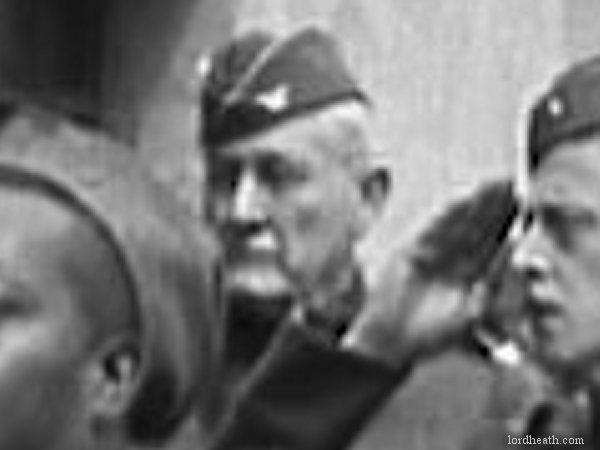 |
Silas D. Wilcox Soldier |
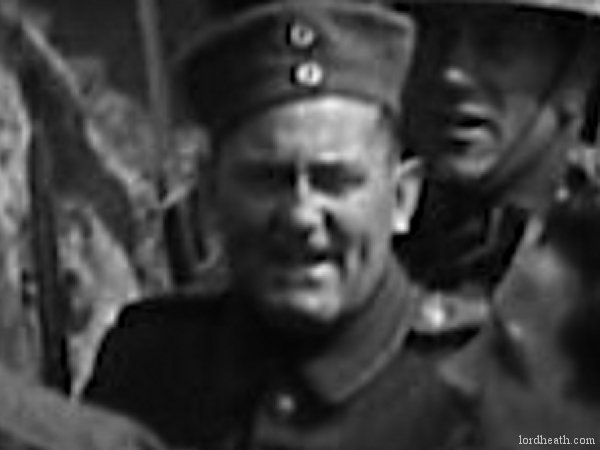 |
Sam Lufkin Soldier |
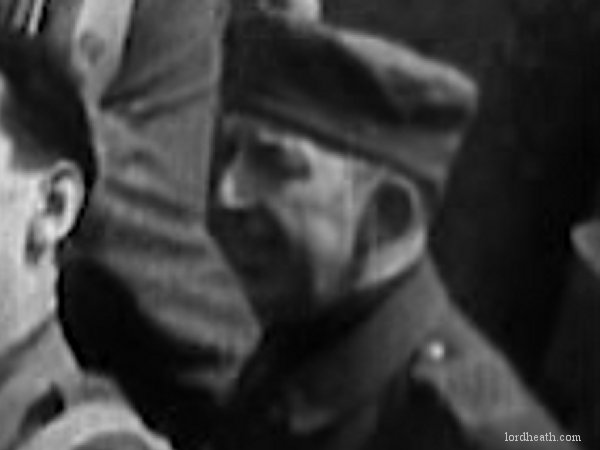 |
William J. O'Brien Soldier |
 |
Jack Hill Soldier |
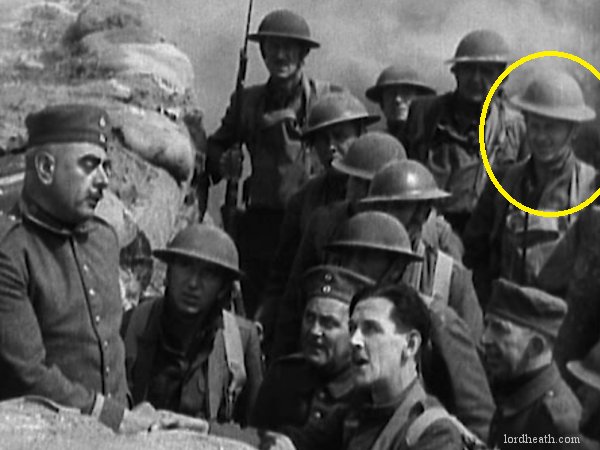 |
Russell Custer Soldier |
 |
Bob Minford Soldier |
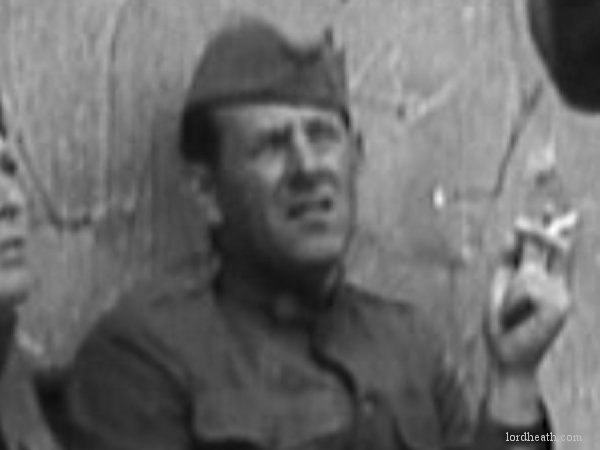 |
Gill Edwards Soldier |
 |
Gordon Douglas Soldier |
 |
Jimmie Adams Guitarist (The Ranch Boys) |
 |
Frank Gage Guitarist (The Ranch Boys) |
 |
Marvin Hatley Trumpet player |
 |
Betty Mae Crane Beverly Crane Talking titles |
Vern Trimble One of The Ranch Boys |
![[Unidentified] in High C's (1930)](web_images/unknowns_high_cs.jpg) |
UNIDENTIFIED Soldiers |
![[Unidentified] in High C's (1930)](web_images/unknown1_high_cs.jpg) |
UNIDENTIFIED Soldier |
| CREDITS (click image to enlarge) |
 |
| Acknowledgements: Smile When The Raindrops Fall by Brian Anthony & Andy Edmonds (book) The Charley Chase Talkies 1929-1940 by James L. Neibaur (book) Jesse Brisson (identification of William J. O'Brien, Sam Lufkin, Silas Wilcox, Russell Custer, Bob Minford, Gill Edwards, Gordon Douglas) This page was last updated on: 16 January 2025 |